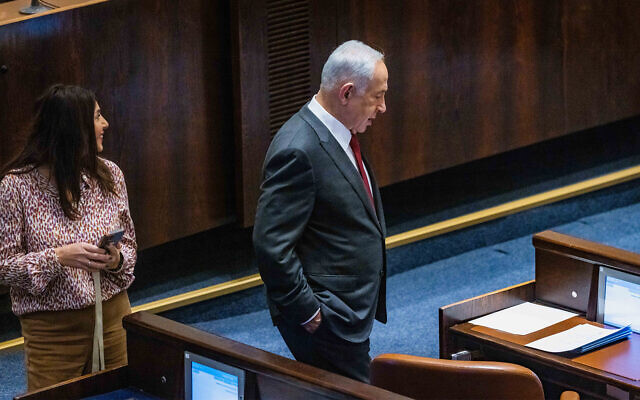Likud-led bloc pushes through legislation crucial to its coalition agreements ahead of next week’s deadline; outgoing justice minister holds up bill with 3-hour speech

The incoming coalition on Friday passed a first reading of highly contentious legislation set down as a political precondition for finalizing the hardline government coalescing under Likud leader Benjamin Netanyahu.
Demanded by Likud’s far-right and ultra-Orthodox partners, the legislation will clear a path for a party leader serving a suspended sentence — Shas’s Aryeh Deri — to helm three ministries, and will enable a member of Religious Zionism, likely party leader Bezalel Smotrich, to become an independent minister in the Defense Ministry in control of West Bank building.
The legislation passed shortly after midnight on Friday morning by a vote of 63 in favor and 52 against. The bill will return to committee debate before being approved for its second and third readings, often conducted together. After they pass their third readings, bills become laws.
The two bills meant for Smotrich and Deri were merged on Wednesday. It requires the support of 61 lawmakers in the 120-member Knesset since it is a change to Israel’s quasi-constitutional Basic Law: The Government.
Two other bills demanded by incoming coalition lawmakers will be voted on in the coming days. One will expand the authority of the national security minister, set to be Otzma Yehudit head Itamar Ben Gvir, over the police force, and another will make it harder for rebel MKs to peel off from their parliamentary factions without sanction.
The new coalition elected Yariv Levin as Knesset speaker on Tuesday in a critical first step to give the incoming coalition control over the voting agenda and won preliminary votes on the bills the same day.
The likely incoming coalition wants the bills to pass into law before the government is sworn in, with Netanyahu having until December 21 to declare he has cobbled together a coalition.
Outgoing Justice Minister Gideon Sa’ar held up the vote on Thursday night by speaking at the Knesset’s podium for over three hours.
“How else are we going to deteriorate after this? What will the next steps be? Are we going to present a law that says anyone who hasn’t been charged with life in prison can be a minister?” Sa’ar said.

He blasted the incoming coalition for prioritizing the bills ahead of anything else.
“This is legislation that has shame attached to it. You could have presented something related to the cost of living, you could have presented something for personal security,” he said to the incoming coalition. “But instead you chose to waste the significant public confidence you got in the election on this shameful legislation.”
In addition to Likud, the three far-right and two ultra-Orthodox parties poised to form Israel’s most conservative government yet were aligned in their support of the bills. Opposition ministers warn that the bills endanger democracy and security, as well as subvert the legal system.
Implanting an independent minister in charge of West Bank building policy within the Defense Ministry requires augmenting one of Israel’s quasi-constitutional Basic Laws, which despite their elevated status, are easily changed with the passing of a bill with the support of an absolute majority of MKs.
Smotrich, who is expected to take the newly-formed position in the Defense Ministry, is a staunch settlement supporter and advocate of annexing West Bank land. The bill for the position will for the first time create a permanent mechanism for two ministers in a single ministry.

Outgoing Defense Minister Benny Gantz said Thursday that the legislation demanded by Smotrich will “break apart” clear chains of command and cause a “loss of security.”
Speaking to the special committee formed to prepare the bill, Gantz said that bifurcating the current command system by putting a second minister within the Defense Ministry in charge of defense-related matters would create “breakdowns.”
“This command system knows how to cope with a concrete operational need and make the necessary system of balances. When you violate the system of balances, you are coming out of an equilibrium that will divert the system from the system of balances that it needs,” the defense minister told the committee.
In addition to the concerns raised by Gantz and by soon-to-be opposition lawmakers who are former security officials regarding confusion of command, the bill also drew criticism from legal advisers who said it does not clearly delineate the responsibilities that will fall under the independent minister within the Defense Ministry.
Critics have also charged that putting an ultranationalist minister in charge of Jewish settlement construction in the West Bank may create a situation akin to annexation. Directing his comments to Smotrich, Gantz said that de facto annexation would be worse than formal annexation, and challenged the incoming minister to force Israel out of its limbo in the West Bank.

In another potential change to a Basic Law, the plenum voted to advance the legislation to let Shas leader Deri take up his planned posts as interior and health minister, and later in the Knesset term, finance minister, despite his recent suspended sentence for tax fraud.
The current law bars someone from serving as a minister if they have been sentenced to prison within the past seven years. It is vague on whether this applies only to custodial sentences or also to suspended terms, and the attorney general recommended that the head of the Central Elections Committee rule on the matter.
Under current law, Deri would need to appeal to the Central Elections Committee to decide whether his tax offenses carried moral turpitude, which would determine whether he could so quickly return to ministerial office. The new bill seeks to deprive the CEC of the power to block Deri.
As reported by The Times of Israel
